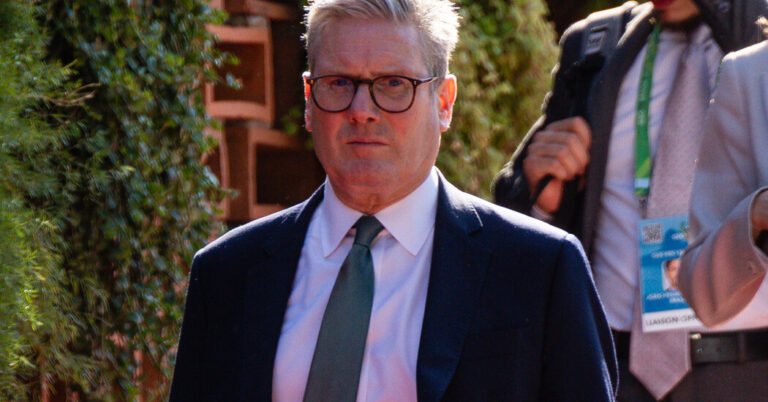Prime Minister Keir Starmer on Sunday offered British troops to help guarantee Ukraine’s security as part of any peace deal, as he and other European leaders convened to coordinate a response to President Trump’s talks with Russia about ending the war in Ukraine.
In an article published in The Daily Telegraph on Sunday, Mr. Starmer wrote that he was “ready and willing to contribute to security guarantees to Ukraine by putting our own troops on the ground if necessary.”
It was the first time Mr. Starmer had explicitly said that he was willing to send British troops to Ukraine. When President Emmanuel Macron of France first raised the possibility of sending Western peacekeeping troops for Ukraine last year, the idea was dismissed by other NATO members. But it has gained traction in recent months, in particular ahead of Mr. Trump’s inauguration.
President Volodymyr Zelensky of Ukraine praised Mr. Starmer’s announcement, telling an online news conference on Monday that it was an “important” start to European deliberations on mustering a peacekeeping force — an idea he conceded still had “skeptics” on the continent.
Mr. Starmer had hinted in January that Britain would be open to the idea, but his article in The Daily Telegraph left nothing open to interpretation, saying that the decision to commit British troops was not taken lightly.
But “securing a lasting peace in Ukraine that safeguards its sovereignty for the long term is essential if we are to deter Putin from further aggression in the future,” he wrote, referring to President Vladimir V. Putin of Russia.
“The end of this war, when it comes, cannot merely become a temporary pause before Putin attacks again,” Mr. Starmer added.
The tenor and timing of his article were notable: Ahead of talks between Washington and Moscow that they say are about ending the war, and on the eve of an emergency meeting of European leaders to formulate a response to them.
In another notable development, the Kremlin on Monday did not reject Mr. Starmer’s proposal outright — a departure from Russia’s past language, in which any suggestion of heightened involvement by NATO members was usually decried by Moscow as a step toward a wider war.
“It would mean that NATO forces would be deployed on Ukrainian territory,” the Kremlin spokesman, Dmitri S. Peskov, said on Monday when asked about Mr. Starmer’s article. “This means that this is a very complicated question, and for now, no substantive discussions have been held about this matter.”
American and Russian officials are expected to meet in Saudi Arabia on Tuesday, for what are said to be preliminary talks but which have raised alarm in Europe over their lack of European and Ukrainian involvement.
Russia’s foreign minister, Sergey V. Lavrov, and Mr. Putin’s foreign policy adviser, Yuri Ushakov, will attend the discussions in Riyadh, according to Mr. Peskov.
The meeting “will be devoted, first of all, to restoring the entire complex of Russian-American relations,” Mr. Peskov said. “It will also be devoted to preparing possible negotiations on the Ukrainian settlement,” he added.
Secretary of State Marco Rubio said on Sunday that if an opportunity presented itself for a “broader conversation,” it would include Ukraine and Europe.
The Riyadh meeting underscores that Mr. Trump has an accelerated timetable for reaching a deal to end the war and that he appears determined to conduct negotiations with Russia bilaterally, at least for now.
Left out of those discussions, Mr. Starmer and the leaders of France, Germany, Italy, Poland, Spain, the Netherlands and Denmark, as well as top officials of the European Union and NATO, will gather in Paris on Monday to discuss the war and European security.
Mr. Starmer wrote in his article that he would urge the other leaders to increase military spending and take on a greater role in NATO.
He added that Ukraine’s path to joining NATO was “irreversible,” signaling a split with the Trump administration, which does not support Ukraine joining the mutual defense alliance. Mr. Starmer plans to travel to Washington to meet with Mr. Trump next week.
Ukraine has made membership in NATO a key strategic aim, hoping that the alliance’s protection would guard against future Russian aggression. But its joining during the war was always unlikely, because doing so would put NATO’s members in direct conflict with Russia.
Mr. Starmer said that Europe and the United States must continue to work closely to secure a lasting peace deal.
“A U.S. security guarantee is essential for a lasting peace, because only the U.S. can deter Putin from attacking again,” he wrote.
The initial response in Britain to Mr. Starmer’s proposal about peacekeepers was cautious. There has been strong support for Ukraine across the political divide in the country, and the British military has been deployed overseas in recent decades, including to Afghanistan and Iraq.
But the failure of those military campaigns illustrates the political risk of sending troops into combat situations — and underscores the importance of achieving a credible and durable end to the fighting in Ukraine before peacekeepers could be deployed.
John Sawers, a former head of the British intelligence service, said there were risks to undertaking such an operation.
“We have to be very clear what the mission is, what the rules of engagement are should the Russians attack,” he told the BBC. “Do we fight back or do we simply report it to some other body?”
Anton Troianovski, Stephen Castle and Andrew E. Kramer contributed reporting.

